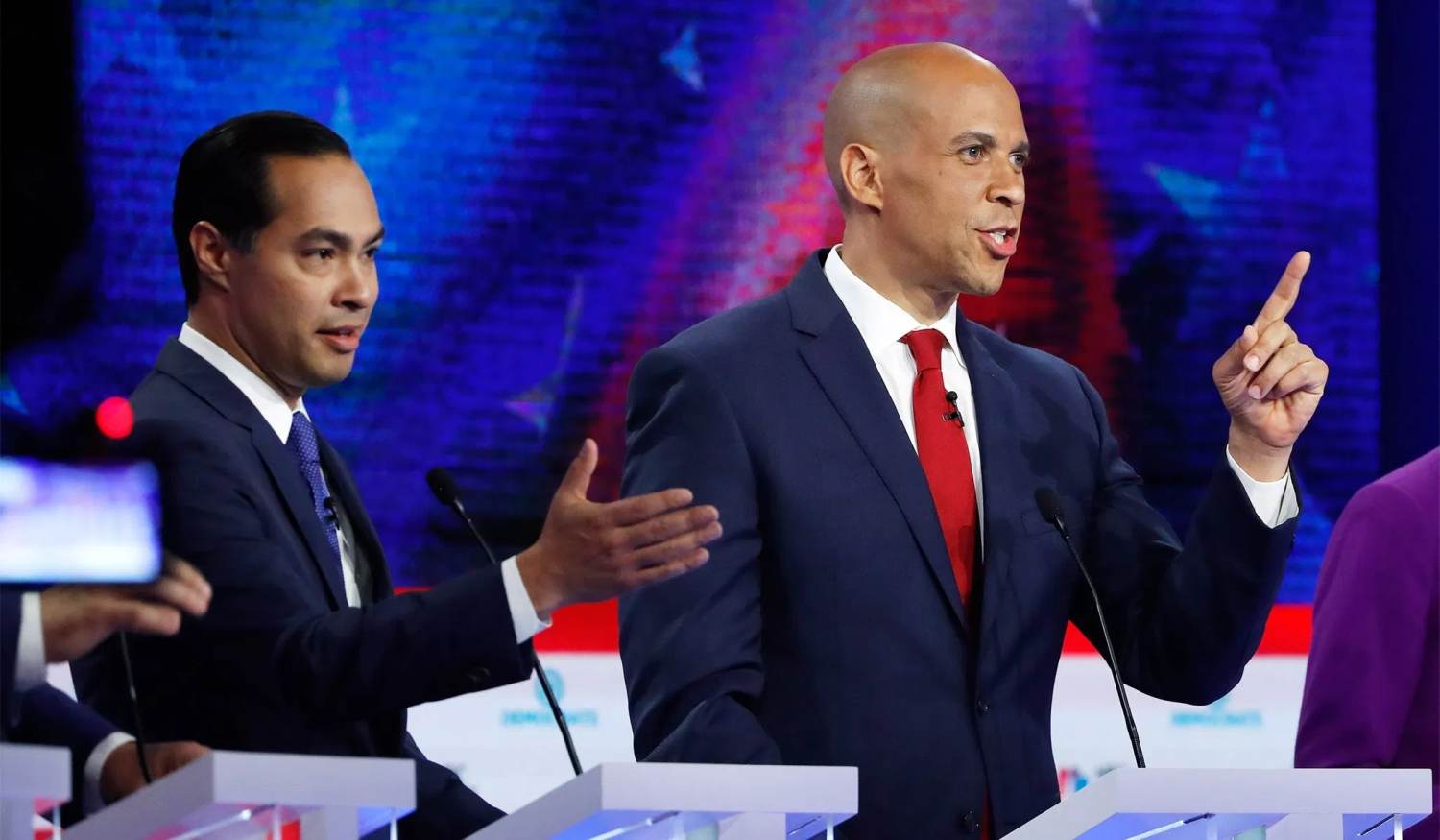In the era of “identity politics,” there’s no question that Donald Trump makes direct and veiled appeals to what he sees as the interests of white people. But Democratic candidates Corey Bocker and Julian Castro are not getting much traction among their own ethnicities. The answer may be that minority groups are more interested in winning than to have “one of their own” in the White House.
According to Politico, one early-State Democrat puts it this way, “I kinda wonder if there are some people who are not giving Sen. Booker an opportunity because in their mind they think that another black male’s not gonna win this soon,” referring to the presidency of Barack Obama.
Their positions are stark.
New polling in South Carolina places Booker among the top five candidates, but his support among black voters is in the low single digits. In Nevada, six candidates are polling ahead of Castro with Hispanics.
It’s not for lack of effort — or credentials. Castro was the first candidate to release comprehensive plans on immigration and policing. He made Puerto Rico his first campaign stop after announcing his candidacy in San Antonio, Texas, where he once served as mayor of the majority Latino city. His team in Nevada is comprised entirely of Latinos, according to a spokesperson, who also said the campaign is eyeing office space in a predominantly Latino community.
Booker, a former mayor of majority black Newark, distinguishes himself as the only candidate who lives in a low-income, inner-city community and touts his bipartisan work on criminal justice reform. The New Jersey senator has also hired a diverse team on the ground in South Carolina, where half of his staffers are African American, including his state director, political director and senior adviser.
Their situations are not for lack of trying. Booker has focused on the fact that African-Americans are jailed at a higher rate than whites, even for the same crimes. “There Are More African-Americans In Prison Today Than Were Enslaved In 1850,” he says.
He also ripped Trump for his recent remarks about Democratic women of color. Young people may be forgiven for not seeing the racism in Trump’s language, but people in their 70s (like Trump) will remember the saying, “Go back to Africa,” that was common in the 1950s but disappeared in the 1960s.
Sen. Cory Booker (D-N.J.), a 2020 presidential hopeful, compared what was said at Trump’s Wednesday night rally to the language used by segregationist former Alabama Gov. George Wallace in the 1960s. . .
Booker said it’s “sadly” the kind of politics America has seen before, noting the “Know Nothing” party used similar rhetoric against Irish and German immigrants in the 1850s.
Reuters notes that Booker has been direct in his talk of race, unlike Obama, who made a clear effort to avoid race. Booker has suggested he’s closer to the people than the millionaires (and billionaires) running in both parties.
When asked about gun safety, he spoke about inner-city violence, saying he was the only candidate who had seven people shot in his neighborhood last week. . .
He speaks often about U.S. racial inequities in criminal justice, voting rights and housing policy, warning Americans must not engage in “historical amnesia” about generations of racist policies.
The latter comment is related to the fact that racial discrimination has been built into American laws for centuries, such as redlining where African Americans may live, or where banks may lend to prospective Black homeowners. But as noted above, Trump won largely as a reaction to having our first Black president. Having another African-American candidate would just give Trump more argument that he’s the “white man’s candidate.”
It’s not quite the same for Castro, who has tried but failed to lead in polls among Hispanic-Latino voters.
Castro was the first candidate to release comprehensive plans on immigration and policing. He made Puerto Rico his first campaign stop after announcing his candidacy in San Antonio, Texas, where he once served as mayor of the majority Latino city. His team in Nevada is comprised entirely of Latinos, according to a spokesperson, who also said the campaign is eyeing office space in a predominantly Latino community.
But Castro’s debate performance made a difference.
Prior to his breakout debate performance, Castro was third with 9 percent support. But since winning plaudits for challenging O’Rourke to do his homework on immigration policy, Castro has also soared from third in net favorability to first, with a net favorability of +35 among those voters.
Castro also reacted to Trump’s attack on the Democratic women.
Democratic presidential candidate Julián Castro described President Trump’s recent tweets attacking progressive congresswomen as “disgusting” and “racist,” but suggested that such language is par for the course for the president.
“Everybody knows that the president acts like a white supremacist. He is a racist, he’s made that clear on so many different occasions,” Castro said Monday on CNN’s “New Day.”
Both candidates are struggling, but it would be interesting to have a president named “Castro” so close after having a president whose middle name is “Hussein.”
Donate Now to Support Election Central
- Help defend independent journalism
- Directly support this website and our efforts
